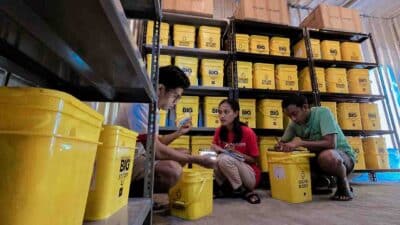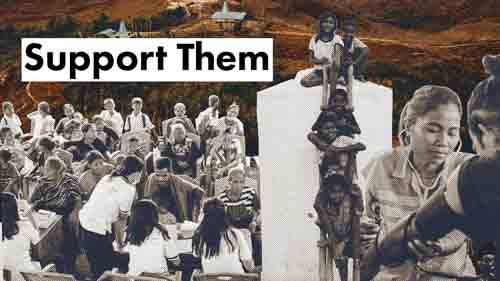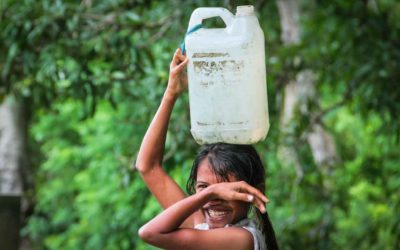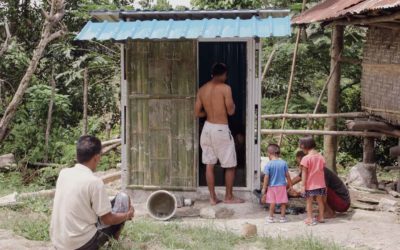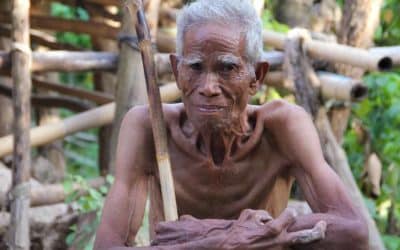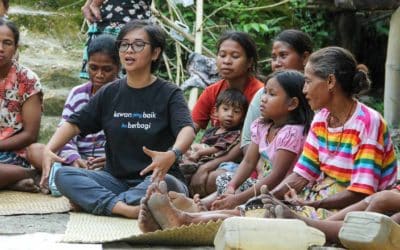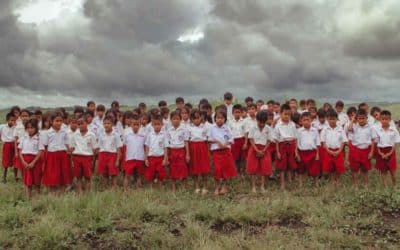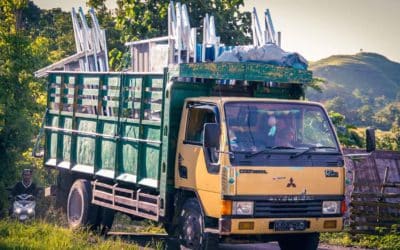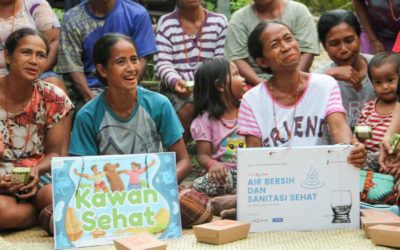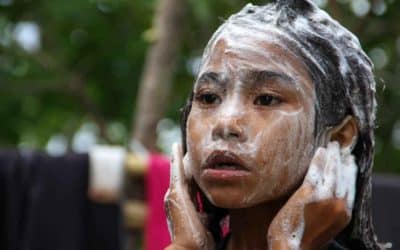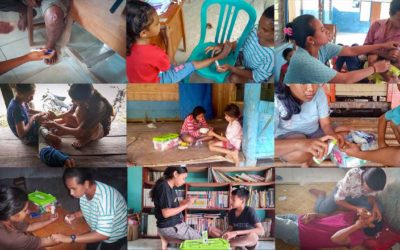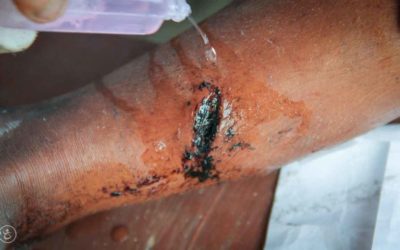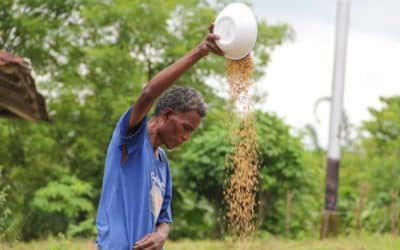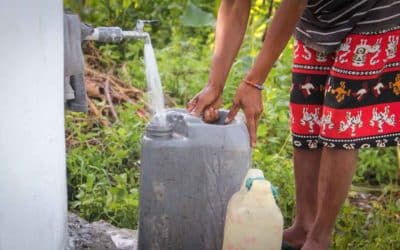Through the Primary Medical Care program, Kawan Sehat health workers provide treatment for fevers, wounds, and malaria in villages lacking access to doctors. They carry essential medicines, adhere to established medical protocols, and refer emergency cases promptly to prevent delays in care.
Donate
Support Care
Programs
All projects
Quick News
Field updates
Stories
Field stories
Welcome to the Fair Future News! Our teams have crafted each article, story, and update.
These pages showcase unique content reflecting our mission, work, and community interactions.
True stories. Real people. Humanitarian action in motion.
Here you’ll find stories from the field—100% real, 100% original. Every article is written by us, by those who live these moments, walk these roads, and treat these illnesses. We write them by hand, after the long days, often from tents or remote villages, because we believe in showing what’s real.
The people, the lives, the wounds, the repairs—this is not fiction. This is our daily reality in ultra-rural Indonesia. Every photo is taken by us. Every word comes from those who act. From emergency responses and clean water to child health and malaria cases, these stories reflect both the daily struggles and the incredible strength of those we serve.
Our News page is more than just updates. It’s a record of direct action. A collection of emotions, medical cases, construction progress, and social encounters. We don’t write for clicks—we write for those who care, those who want to know, and those who support our mission.
It’s raw, human, sometimes difficult, but always true. Read them, share them, let them move you. This is how change begins—with knowledge, emotion, and connection.
Alex Wettstein – Fair Future Foundation – Updated in June 2025
Your donation becomes real medical care
Help us reach the unreachable. Every franc you give funds medicines, dressings, tests, and clean water to prevent sickness. It powers solar lights for cold vaccines and night care. It keeps Kawan Sehat agents and Fair Future teams travelling hours to remote villages without doctors or clinics.
Our latest articles
Jerry cans here in East Sumba, are worth gold
This "Picture of the Day" shows you a young girl between ten and twelve, returning from the only water point in the village. She had to walk a few kilometres to fetch these five (5) litres of water, which is unhealthy since everyone does the laundry at this water source. This small amount of water will be used by his family, who, on average, can only use 2 to 3 litres per day per person. Location: Mata Air Payianu, Prai Paha, Nggaha Oriangu, Sumba Timur, NTT.
The jerry cans? They are essential because it is the only, or cheapest, way to fetch water from wells and distant water sources. They're also handy as they have a cap, but all here also use plastic to make a rudimentary 'seal' to make the container even more airtight, so you don't lose any water along the way. These cans are old 5-litre cooking oil cans. Once empty, people have to buy them expensively for their water needs. Some are years old and have travelled thousands of miles on the heads of these East Sumba children.
Here at Rumah Kambera, Fair Future and Kawan Baik staff have recovered quite a few ancient ones. We exchanged them for new ones, which we brought filled with water, clean and healthy with the Truck of Life.
In a few days, we will be there and collect more old jerrycans. They are true testimonies, like certain people's faces: Marked by hours of walking and exhausting work, fatigue exhaustion; these are often beautiful faces that we don't forget.
My family is going to have toilets at home
This "Picture of the Day shows you a family looking at the Fair Future and Kawan Baik teams who are finishing the construction of the first toilets in the history of this family, of this small group of houses. It's an incredible event for all of them who, until now, went out into nature to pee and poo. Location: Prai Paha, Nggaha Oriangu, Sumba Timur, NTT.
These toilets are part of more than forty toilets – healthy sanitary facilities – built by the Foundation as part of the #waterconnections project in East-Sumba. We also had to drill three deep wells and build more than thirty water reservoirs with a capacity varying between 3,500 and 24,000 litres, all connected by tens of thousands of meters of HDPE pipes.
Learn to live better? There is no age for that!
This "Picture of the Day": To live old, live happily, as the saying goes. This man is not old, but the harshness of life here, the hours spent on gravel and dirt roads fetching unhealthy water and consuming it, give him the traits of an old man from the village. Location: Padi, village of Mbinudita, East Nusa Tenggara.
An old bamboo cane that he made himself, just a pareo to wear, his skin tanned by the sun and the work in the fields, the rice paddies. His thinness is linked to eating his fill here being impossible. Him? He's not that old, but he doesn't know his age. He tells us: 60 years. And he is there, we have known him for a long time. He attends the meeting with the families of Padi, Mbinudita, and East-Sumba.
He listens to us talk about the means that can be put in place so that he too can have a better life, a life with less water stress, less disease, and more to drink and eat, thanks to the means and infrastructures that Fair Future and Kawan Baik have built the last four years here.
Learning how to live healthier in rural areas
Thanks to the Fair Future & Kawan Baik teams on site and the various publications that our two foundations have produced for them, we share a few hours in each group of houses, in each village where Fair Future and Kawan Baik have carried out one or more projects related to access to drinking water and to toilets and other sanitary facilities. Together, we learn the means available to the villagers to have a healthier life, with fewer illnesses, to eat and drink better, to wash more, to take care of themselves and one’s families.
Some of the children of SD Mbinudita, East Sumba sing
This "Picture of the Day": Yesterday, we asked the children to sing a song outside, in front of their school in SD Negeri Mbinudita. A song that we recorded and which will serve as a support for the film "Matawai", which Fair Future produced. A film about the immense problems linked to the lack of clean water here in this region… Location: SD Negeri Mbinudita, East Nusa Tenggara.
In 2019, there were only about sixty, in 2023 there are more than a hundred and this is increasing. From three classes, we went to five and it will grow even more during the year. More children mean more classes, more teachers and more life too.
Yesterday, Kawan Elthon, Primus and Ino recorded the children singing a song called: "Akulah Sang Air", which means: "I am water". So yesterday was a great day for all these little ones, to whom we explained what we were doing. Soon you will be able to hear them as part of the film "Matawai" (water sources) which will be presented in the next two weeks.
"Akulah Sang Air – I am water"… Nothing could be more true here for all these children whose primary mission -in their everyday life- is to often cover several kilometres on foot, to fetch a few litres of water which is potentially dangerous to health. But since 2019, Fair Future and Kawan Baik are changing things here, in this huge region of Prai Paha, Nggaha Oriangu in Sumba Timur. All now have access to a source of clean water via #waterconnections, to a school #sdmbinudita, to primary medical care #primarymedicalcare among others…
A truck full of sanitations and toilets built by us
This "Picture of the Day" shows you a truck loaded with metal constructions, which we transport to the rural villages of East Sumba. These are sanitary facilities built entirely by our teams in Rumah Kambera, which will be assembled in the houses -groups of houses-, so that the families can, for the first time in their lives, benefit from toilets and showers. Location: Prai Paha, East Sumba Regency, East Nusa Tenggara.
Rather than donating tons of medicine to cure these illnesses linked to lack of hygiene, we are building healthy sanitation facilities. Because now, Fair Future and Kawan Baik foundations have given them access to clean water, having toilets is possible.
Access to healthy toilets is an important challenge for children's health. Here in rural areas, very few households use sanitation facilities, often with serious health and environmental consequences. Fair Future and Kawan Baik know better than anyone that quality toilets save lives. They are essential to preserving the health of children by preventing the spread of disease through human faeces.
Together, learn to have a healthier life at home
This "Picture of the Day" shows some villagers from this ultra-rural region of East Sumba. They learn with all of us how to have a healthy, more harmonious life, thanks to the Fair Future & Kawan Baik teams on-site… and to the various publications our two foundations have produced for them. Location: Prai Paha, East Sumba Regency, East Nusa Tenggara
Partnerships for the objectives, because it is all together that they will manage to change things in their villages: How to no longer suffer the inconvenience of water stress and correctly use the #waterconnections facilities that are now available to them. Learn to take care of yourself and the children who make up the majority of children in the region.
To achieve this, we invite them to take care of themselves. By washing more because there is water here now. By no longer using detergent to cleanse the body, hair or private parts, children and newborns included. By treating a minor injury or health problem before it becomes severe. And perhaps more need to disinfect a wound with motor oil, gasoline or diesel, the misdeeds of addictions related to tobacco, Siripinang, and alcohol, especially in children. All this can be done within the framework of the various programs for access to healthcare initiated by Fair Future and Kawan Baik, in particular those linked to access to Primary Medical Care (PMC).
Live better and longer by drinking more, eating better and using the healthy sanitation facilities we have built; and so many things that we are discussing with them here in the field in East Sumba, with the foundation's socio-medical teams.
If I can wash, it’s because I have water now!
In this "Picture of the Day", a young girl from the village of #Mbinudita is happy because now she and her family have access to water, so they can wash. Before for her, washing was once every two weeks, even once a month for others from the same village. Location: Prai Paha, East Sumba Regency, East Nusa Tenggara
The consequences of not washing on the body are disastrous: Development of microbes on the skin causing many skin diseases such as Scabies, ringworm, or dermatosis, and also much more graceful diseases: Typhoid fever, Hepatitis A, and Cholera. Not being able to wash leads to death linked to the development of the diseases mentioned. It is also a strong signal of the lack of water in a village. Not being able to wash for lack of water also means not being able to eat and drink enough.
Practising good personal hygiene is essential to allow proper functioning of the skin (breathing, secretions). Washing keeps the skin healthy, relaxes the body and maintains a positive self-image. This is why Fair Future and Kawan Baik develop solutions for access to better health by providing access to healthy and clean water. The cheapest and most effective drug.
These teachers who save lives!
In this "Picture of the Day" The work of these female superheroes, who have performed hundreds of primary medical procedures since December 2022. This program is because there is no access to medical care here. These women are the only possible resources, and what they do is extraordinary. Location: East Sumba – NTT.
The primary medical care program that Fair Future and Kawan Baik have set up is unique worldwide. A reminder? This program aims to provide theoretical and practical means to teachers in isolated villages to offer first medical care in the event of injury or illness of a child or an adult. It's simply outstanding; it saves lives.
It focuses on specific populations, groups and communities that are excluded from healthcare access systems and left behind. It offers knowledge and tools to teachers in ultra-rural villages to heal and save lives. It is the teachers of schools isolated from everything who provide first aid; 95% of them are women. There is no doctor or access road here, and the nearest health centre is often hours away. Fracture? Malaria? Dengue? A snake bite? A burn? A choking person? Acute fever in a child? These women, these teachers from isolated villages, are also caregivers, real heroines in their interventions.
On-site Primary Medical Care Program Assessment
This primary medical care program in ultra-rural areas, which we initiated and started last year, is extraordinary, it saves lives. Since December 2022, the participants in the primary medical care program – who are the village teachers – have been providing first aid to children and villagers. They treat wounds, diseases, malaria, dengue fever. Images taken by teachers in their villages.
In principle, we should eat every day!
In this "Picture of the Day" a man who must be 40 years old (but who seems much older), is going to prepare the little rice he has found in the house. It will be for his meal or all those of the week certainly. He cleans it with the wind blowing, throwing it in the air from his rattan basket in front of his house. Here in the ultra-rural villages, few people own rice fields, so they have to buy rice when they can. Location: Desa Mbinudita – Prai Paha.
Eating healthy here? It is very complicated, it is even impossible. The water available is scarce, even if we change this in certain regions. All the meals for these families in East Sumba – where Fair Future and Kawan Baik set up socio-medical projects – consist of corn and a little rice when the families have it.
Vegetables are far too rare or you have to look for those found in the forest, in nature. Meat is almost never present, or when there is a feast they will kill a pig or goat to cook it and share it with friends and family. Fruits? Maybe one day, in a photo, they saw some.
In #sdmbinudita, East-Sumba, the #waterconnections project provides access to healthy and clean water sources close to families' houses. They can cook, and have a vegetable garden to grow their own vegetables. Gradually, habits change, and the health of the villagers improves.
Water Connections, look at all we’ve done!
Look at what has been done in the last 20 months, it’s simply extraordinary because doing this in this region was a priori impossible, but we did it. We are at the end of the line in the Water Connections project, we have “only” a few things left to build, including a huge 25,000-liter tank. Here is the project map for you, so you can see all that has been done in this ultra-rural region, one of the poorest in Southeast Asia.



